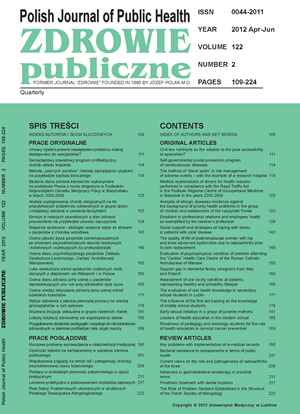Key problems with implementation of e-medical records
Keywords:
health care, e-medical records, the Medical Information SystemAbstract
According to Article 57 Act of 28 April 2011, the information system in health care (Journal of Laws No. 113 item 2011. pos. 657 as amended), medical records generated after 31 July 2014 must be kept in electronic form. Analysis of the current state of implementation of e-medical records indicates that this time limit is seriously threatened. Its observance is possible, but requires identification and analysis of key issues (barriers, risks) associated with this process, as well as active coordination and acceleration of work on it, including the active involvement of the Ministry of Health.
The main problems associated with the introduction of e-documents are, according to the authors, not related to the sphere of financial constraints, but to the lack of standards of keeping and exchange of e-records and the acceptance and commitment of major stakeholders, particularly physicians in this process. If the statutory time limit is to be respected, the Center for Health Information Systems should prepare standards of keeping and exchange of e-records no later than in 6 months.
Promoting acceptance and involvement of key stakeholders in the implementation of e-medical records, especially doctors, should become a priority for health policy in 2012-2014.
References
1. „E-zdrowie dla zdrowszej Europy”; raport firmy Gartner; http://www. calliope-network.eu/LinkClick.aspx?fileticket=Tmkyr%2FQNsaU- %3D&tabid=277&mid=633
2. Jha AK, DesRosches CM, Campell EG, et al. Use of electronic health records in U.S. hospitals. New Engl J Med 2009; 360:1628-1638. http:// www.nejm.org/doi/full/10.1056/NEJMsa0900592#t=article
3. PN-SIO/IEC-17799:2005 Technika informatyczna. Praktyczne zasady zarządzania bezpieczeństwem informacji. PKN; 2007.
4. PN-I-13335-1: Technika informatyczna. Wytyczne do zarządzania bezpieczeństwem systemów informatycznych. PKN; 1999.
5. PN-ISO/IEC 13888-1 1999 Technika informatyczna – Techniki zabezpieczeń – Niezaprzeczalność – Model ogólny.
6. Kocot WJ. Wpływ Internetu na prawo umów. Warszawa: Wydawnictwo Prawnicze Lexis Nexis; 2004.
7. Por. wyrok Sądu Najwyższego z 9 grudnia 1980 r. sygn. akt. II URN 171/80 OSP 1981/7/126.
8. Czasem muszę chować głowę w piasek. Rozmowa SZ” – z dr praw Wojciechem Rafałem Wiewiórowskim, Generalnym Inspektorem Ochrony Danych Osobowych, rozmawia Krzysztof Nyczaj. Służba Zdrowia 2012; 14 czerwca 2012:21-4.
9. PN-EN 13606-1 Informatyka w ochronie zdrowia przesyłanie elektronicznej dokumentacji zdrowotnej.
10. European Interoperability Framework for European Public Services (EIF) Version 2.0. http://mswia.gov.pl/download.php?s=1&id=10012
11. Bielewicz A, Czerniejewski B, Kosieliński S, Rutkowski P. Platforma P1 do celów statystycznych i zdrowotnych. Fundacja Instytut MikroMakro; www.mickromakco.pl 30.07.2012


